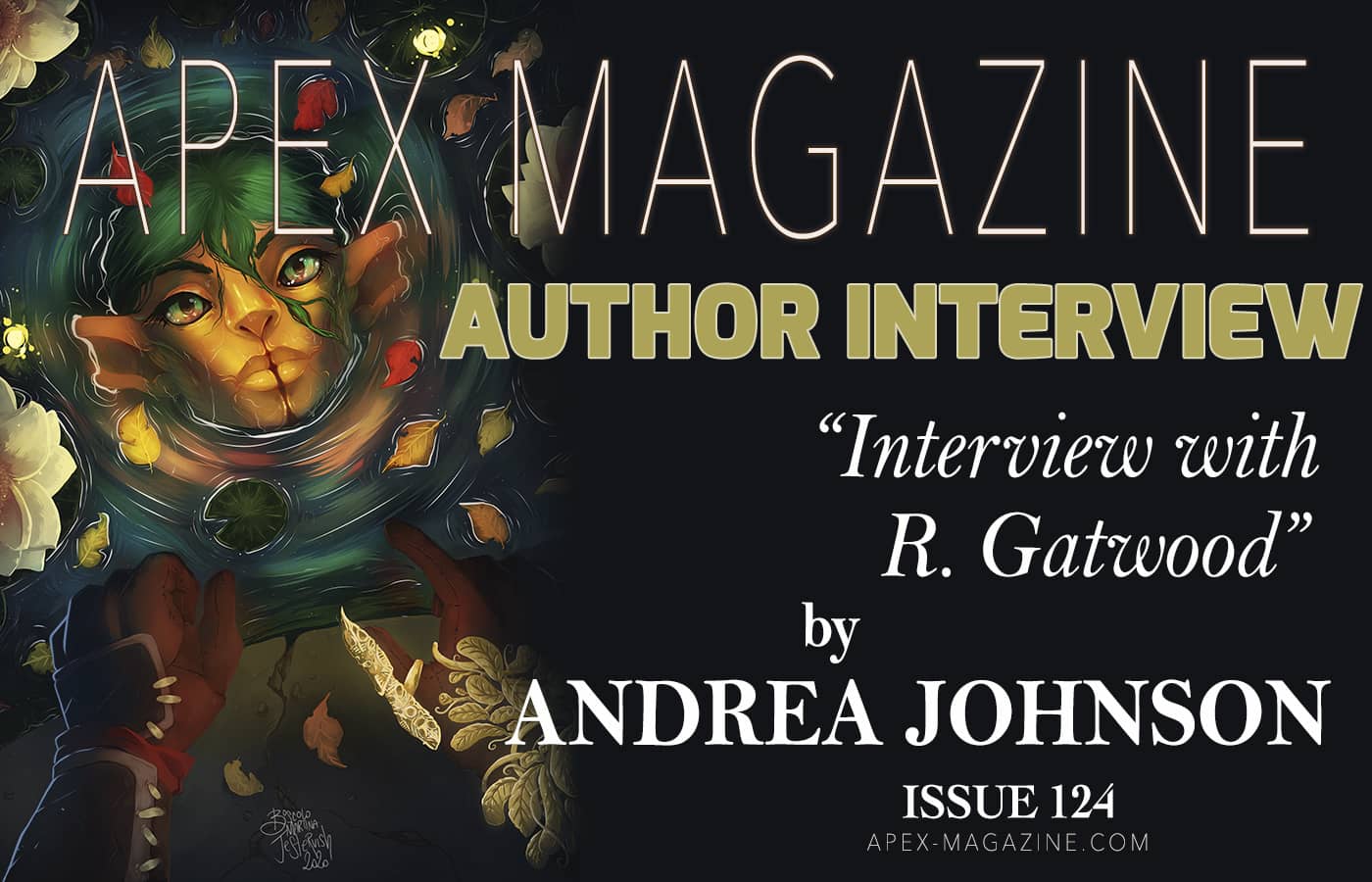
R Gatwood is concise. Writing mostly ultra-short fiction, Gatwood spends words the way the rest of us spend our retirement funds: carefully and for maximum effect. With sharp prose that suggests entire lifetimes and entire relationships in a few sentences or less, I recommend you seek out Gatwood’s fiction to truly see how powerful a few well-placed words can be.
Apex Magazine has published a handful of stories this year about being good. Stories that make us think about what is the definition of good, who controls that definition, and what happens when people disagree on the definition. Gatwood’s story, “How to Be Good,” puts another twist in the conversation. I’m going to spoil the story for you: no one in this story is good, although I’m sure at least one character would disagree with me.
Renward, the protagonist of “How to Be Good,” deliberately takes good care of himself. He eats a good, healthy breakfast, he participates in trainings and drills at work. He always makes sure he does the right thing, because he wants to be good. He tells himself that if he is good, the agency will call him in to do the work that he is so good at And if his phone doesn’t ring, if the agency doesn’t call? It just means he will have to practice and study more, because a good person is continually trying to improve themselves.
“How to Be Good” is a story about a monster. I leave it up to the reader to define good and monster.
Renward is able to do the things the agency asks of him, and he is so very, very good at his job. The Agency takes good care of Renward too. They make sure he is able to continue coming back to do work for them. They ensure he doesn’t burn out.
Gatwood is a fantastic horror writer, encouraging the reader to imagine all sorts of terrible things that happen in those rooms where Renward works. In one room is Renward and a young child. Observing through video in another room, is the child’s father. Adding to the effect is that it’s never explicitly stated if Renward understands what he does for a living. What is explicitly shown, though, is what Mark does to him so that Renward can keep doing such a good job for the agency. Adding to the impact of the story is the gut-punch at the end, a definitive statement after so much ambiguity.
Like I said, I leave it up to you to define monster.
“How to Be Good” is one of Gatwood’s longest published stories. Gatwood specializes in micro-fiction and one-sentence stories, such as the famous “Dandelions, Actually.” and has had work in Nanoism, Cuento Magazine, Every Day Fiction, Monkeybicycle, and Wigleaf. You can follow Gatwood’s very short tweeted stories at @iwantanewhead.
Out of respect for conciseness, let’s get right to the interview.
APEX MAGAZINE: Where did you get the idea for this story?
R. GATWOOD: It emerged from two seemingly unrelated threads of thought.
One thread was about rationalizations for torture (and arguments against it). I’ve always been struck by the implausibility of the scenario in which we, the good guys, are forced to torture someone to save innocent lives. A little reading confirmed my suspicion that it’s pure fantasy.
The other thread was a nagging question: How can any of us be certain we’re doing good in the world? I’m sure all writers of dark fiction have sometimes wondered if they’re making the world a better place by sharing the horrors inside their hearts. Renward’s story is a nightmare about good intentions twisted into monstrous actions.
Early on, I envisioned the story as a single lengthy torture scene, but I quickly realized the physical torture would be unnecessary.
AM: What was it like to write Renward’s point of view?
RG: I love point-of-view characters who have strange passions, strange moral compasses, and an inability to recognize the strangeness of either. Writing Renward came very naturally to me. The key to his character is that he loves being cruel, he loves being kind, and he’s foolish enough to believe he can be both at once.
The first draft of this story opened with Renward waking up. That was a bad opening, but a good exercise. Writing the mundane physical details of his life gave me a stronger feeling for him as a character.
<Editor’s note: spoilers ahead!>
AM: Oh boy, that ending! At what point did you know the story would end like that? Mark does that to Renward every single time, doesn’t he?
RG: Yes! I knew from the start that Renward was being exploited, and that I wanted to hold back the reveal till near the end. In early drafts, I tried to use Renward’s own point-of-view to show that his memory had been wiped, but (thanks to my wonderful writing workshop) I realized Mark’s point of view would make it much clearer.
AM: You are known for flash fiction and micro-fiction. What was your writing process like to write a 4,500 word short story?
RG: Well, in very short fiction, you typically skip to the crux of the story and let the reader fill in the rest, so you don’t have to worry about high-level structure so much as timing. It’s almost like telling a joke. Longer stories aren’t my strong point, but in this case, alternating between Renward’s and Mark’s points-of-view gave me a firm structure that made things easier.
I’ve recently been working on a more loosely structured story of over twelve thousand words. The complexity of the outline is daunting. Someday maybe I’ll work up to a novella or a novel.
AM: Do you have any advice for loquacious writers who want to get better at being concise? What tips do you have for cramming entire lives and stories into a single sentence?
RG: Above, I compared writing very short fiction to telling a joke—which is a good place to start. Take a brief joke, or a clever observation, and find the most economical possible way to set up and deliver the punchline. As you revise, you may realize you can add a twist that makes it more than just clever. At its best, very short fiction makes the reader reflect, or savor an irony, or feel sucker punched.
Another tip is to be willing to spend hours on a single sentence. Some of my short fictions come out in a single spontaneous draft, but many require dozens of revisions, especially if they start out too long.
The last and best advice I can give is to brainstorm. Once you get in the habit, you see tiny ideas everywhere.
AM: When you have an idea for a story, how do you know if it is best expressed as micro-fiction or a short story of a few hundred (or thousand) words?
RG: A micro-fiction idea tends to arrive as a telling detail, a poignant moment, or a twist on something familiar. I never expand such ideas, but in a few cases I’ve condensed an idea that I thought would be a long story and made it a micro-fiction. For example, here’s one that appeared in Nanoism.
“Every night the mail is on the table beside a covered dish. Sometimes a note: ‘Do you love me?’ If I did, I’d have changed the locks by now.”
That micro-fiction started its life as a long story about a man sneaking into an ex-friend’s house to take care of him. Maybe someday I’ll expand it.
A long story idea tends to arrive with more moving parts. “How to Be Good” needs to be as long as it is so it can build up anticipation, explain Renward’s misguided moral compass, and establish the memory-wiping drug.
AM: When crafting new short stories, do you have favorite themes or ideas that you find yourself returning to again and again?
RG: I dwell a lot on the ways people hurt each other, sometimes on purpose, sometimes by accident. I write a lot about creepiness and what it means to be creepy. I enjoy stories of obsession, especially obsession that contains or masquerades as love.
My science fiction plots tend to hinge on a single speculative element (in this case, the memory drug). I world build out from there.
AM: Who are some of your favorite writers and artists? What makes their work meaningful to you?
RG: I love Franz Kafka and David Foster Wallace’s ways of analyzing the minutiae of the world and of showing the limits of that analysis. I love Shirley Jackson’s ability to find the disturbing in the ordinary.
AM: Thank you for this enlightening conversation!












